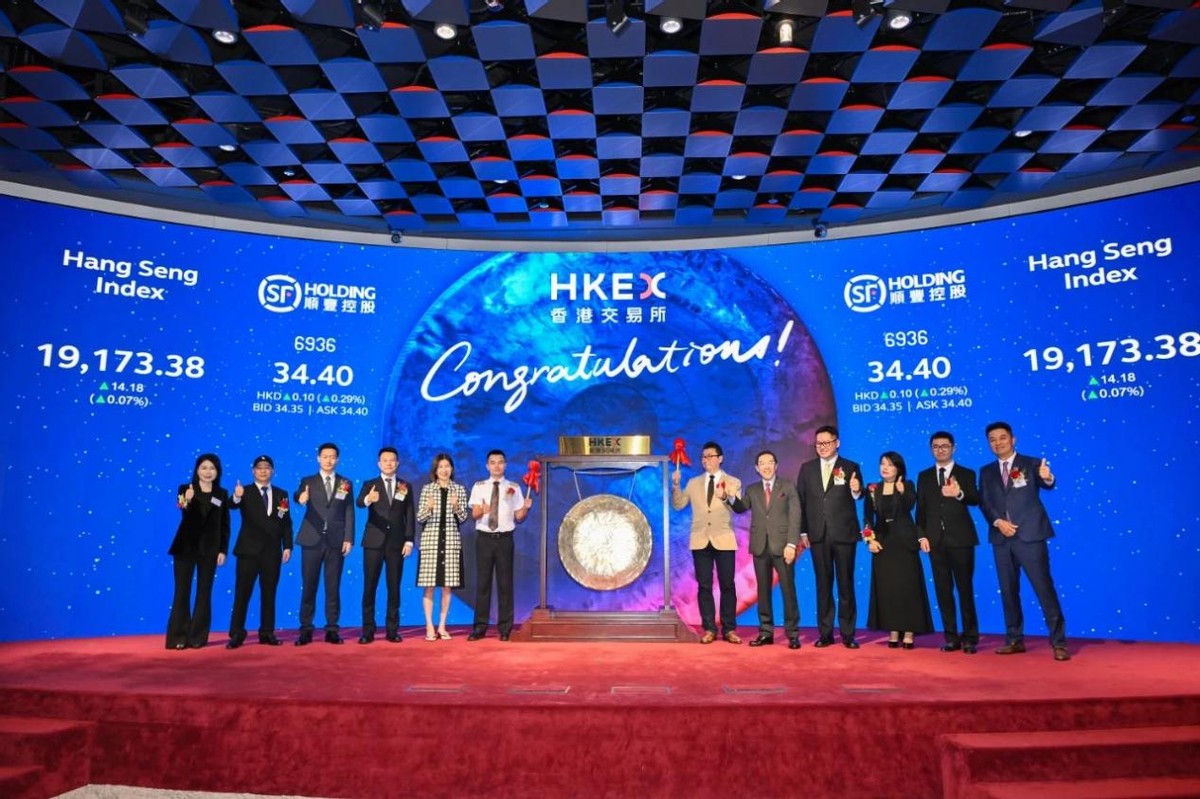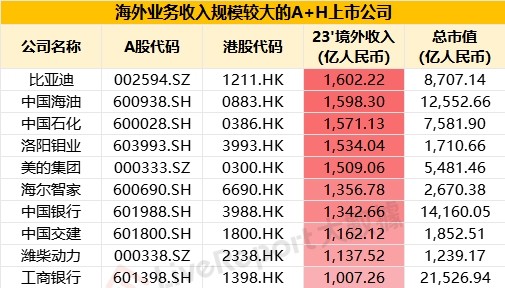A-share leaders heading to Hong Kong for dual listing, riding the wave of globalization
![]() 12/01 2024
12/01 2024
![]() 593
593
In the current changing global capital market, the wave of A+H dual listings is undoubtedly a compelling phenomenon.
KPMG noted in a report that by the end of the third quarter, Hong Kong had returned to the ranks of the world's top five IPO markets, primarily due to the successful Hong Kong listing of Mainland China's large home appliance manufacturer Midea Group in the third quarter, which also became Hong Kong's largest IPO since 2022.
Recently, SF Holding also successfully listed on the Hong Kong Stock Exchange, offering 170 million H shares globally at a price of HK$34.3, raising HK$5.831 billion in its IPO.
Faced with many well-known A-share companies listing in Hong Kong and establishing dual financing platforms in both Mainland China and Hong Kong, the Chief Executive of the Hong Kong Exchanges and Clearing Limited, Charles Li, recently stated at the second HKEX China Forum that for companies already listed on the A-share market, if certain conditions are met, they can enter a fast-track approval process when applying to list on the Hong Kong Exchange.
The tide of A+H listings is surging. What are the reasons behind this trend? And what new opportunities does it bring to Hong Kong stock investors?

A-share companies flock to Hong Kong for listing: driven by three factors
This year, Midea Group, SF Holding, Loongpan Technology, Hengrui Medicine, and Haitian Flavoring & Condiment have conducted/completed IPOs on the Hong Kong stock market or announced related plans. Behind this phenomenon lie three primary factors.
Firstly, there is strong policy support.
In recent years, the China Securities Regulatory Commission (CSRC) and the Hong Kong Stock Exchange have frequently signaled cooperation and introduced a series of policy measures to facilitate Mainland enterprises' listing in Hong Kong.
In April this year, the CSRC announced five cooperation measures for the capital market with Hong Kong, including further broadening the scope of eligible products for stock ETFs under the Shanghai-Shenzhen-Hong Kong Stock Connect, incorporating REITs into the Connect, supporting the inclusion of RMB trading counters in the Hong Kong Stock Connect, and supporting leading Mainland enterprises to list in Hong Kong. In November, Wu Qing, Chair of the CSRC, spoke at the third International Financial Leaders Investment Summit in Hong Kong, stating that they would maintain smooth overseas financing channels, further enhance the efficiency of overseas listing filings, actively support eligible domestic enterprises to list overseas, and better utilize both markets and resources.
The Hong Kong Stock Exchange also introduced a series of listing rule and market reforms in the second half of the year aimed at enhancing the vitality and international competitiveness of the Hong Kong market. For example, it lowered the market capitalization threshold for specialized technology companies applying for listing under Chapter 18C.
From broadening the scope of eligible stock ETF products under the Shanghai-Shenzhen-Hong Kong Stock Connect to supporting Mainland enterprises' listing in Hong Kong, these policies undoubtedly pave the way for A-share companies to list in Hong Kong.
Secondly, this is an inevitable choice for capital operation.
Besides policy factors, A-share companies listing in Hong Kong is also an inevitable outcome of capital operations.
The Hong Kong stock market offers more diverse financing methods and convenient financing channels, helping enterprises quickly raise funds and improve financing efficiency.
The two leading enterprises in the industries that listed in Hong Kong in the second half of this year—Midea Group and SF Holding—were warmly received by Hong Kong stock investors. Midea Group's public offering was 5.31 times oversubscribed, and its international placement was 8.06 times oversubscribed. SF Holding's public offering on the last day of its IPO was 79 times oversubscribed, involving HK$47.3 billion, with a planned fundraising of HK$586 million. Brokerage financing subscription funds reached HK$30.594 billion, with a subscription multiple of 52.19.
This also reveals that the Hong Kong stock market is becoming a more attractive financing channel, increasingly appealing to enterprises aiming to maintain the vitality of their capital markets.
Finally, there is a strategic consideration behind A-share companies' listing in Hong Kong related to global layout .
The Hong Kong stock market is highly internationalized and liquid, attracting more international investors. Through the Hong Kong stock market, enterprises can better connect with the global market, enhancing their international visibility and competitiveness.
For example, Midea Group, which has always emphasized that it is "not short of money," aims to use the funds raised to expand its overseas business, primarily focusing on global R&D investment, smart manufacturing system and supply chain management upgrades, improving global distribution channels and sales networks, as well as operating funds and general corporate purposes.
Similarly, SF Holding also stated during investor activities that the company has ample cash flow, and the core purpose of planning an H-share listing is to make the company a more international enterprise. On the day of its listing, Wang Wei, Chairman of SF Holding, also mentioned, "Listing in Hong Kong is of great significance to SF. The group can better develop the international market relying on the Hong Kong platform."

SF Holding's fundraising will also primarily be used to strengthen international and cross-border logistics capabilities, research and develop advanced technologies, laying a solid foundation for the company's global development.
From the giants' words and actions, it is not difficult to see that under the resonance of multiple factors, the wave of A+H dual listings will continue. So, what opportunities will this trend bring to Hong Kong stock investors?
Opportunities in the A+H dual listing wave: grasping the pulse of the times
Overall, most enterprises that have achieved an A+H listing structure in recent years come from industries such as automobiles, mining, home appliances, and pharmaceuticals. Among them, the new energy vehicle and home appliance industries are highly competitive domestically in going global, while other industries usually exhibit stable performance or strong growth attributes, providing investors with value or growth investment opportunities.
According to LiveReport big data statistics, based on overseas business income in 2023, the combined overseas business income of 144 A+H listed companies reached RMB 2.5 trillion, accounting for about 9% of their total revenue. Among them, ten companies have overseas revenue exceeding RMB 100 billion.

Image source: LiveReport official account, LiveReport big data
It is worth mentioning that these leading enterprises listed in both A and H shares often have strong market appeal and capital cohesion. When leading companies perform well, they often attract capital inflows into other stocks in the same sector, thereby driving the entire sector upwards.
Under the trend of leading Mainland industries heading to Hong Kong for listing, the increase in high-quality investment targets has boosted the liquidity center of the Hong Kong stock market, laying the foundation for enhancing its medium- and long-term market performance.
In the future, with the continuous surge of the A+H dual listing wave, Chinese enterprises leveraging the capital market to strengthen their global competitiveness are expected to bring more investment opportunities. For the Hong Kong stock market, this will further consolidate and enhance its competitiveness as an international financial center.
At the same time, dual listing provides investors with more diverse options and promotes two-way capital flows between China and the world.
Dual listing helps companies connect with global investors. Under the interconnection mechanism, investors' options continue to expand, extending from the Shanghai-Hong Kong Stock Connect to the Shenzhen-Hong Kong Stock Connect, and further to the Bond Connect and Swap Connect. Services continue to be optimized and upgraded, and trading activity increases, bringing a win-win situation for both the Hong Kong and Mainland China markets.
Charles Li, Chief Executive of the Hong Kong Stock Exchange, mentioned that over the past decade, the interconnection mechanism has been operating smoothly, with nearly 77% of foreign capital holding Mainland stocks through the Shanghai-Shenzhen-Hong Kong Stock Connect.
As high-quality A-share enterprises flock to list in Hong Kong, it can bring more opportunities for investors seeking to invest in quality Mainland enterprises.
Of course, it should be noted that due to the differences between the Hong Kong stock market and the A-share market, investors should focus on core competitiveness and anchor long-term value in their investment strategies.
Regarding this, Jiang Han, a senior researcher at the RDIAC, pointed out that the Hong Kong stock market, as a typical market dominated by institutional investors, has relatively high requirements for a company's quality and development prospects. Companies without core competitiveness will not receive excessive capital favor in the Hong Kong stock market but will instead incur more regulatory compliance costs.
The success of Midea Group and SF Holding's IPOs in Hong Kong since the second half of the year essentially reflects their excellent business performance.
Midea's third-quarter report showed that due to industrial upgrading, increased investment in ToB business, and improved product strength, the company achieved revenue of RMB 102.2 billion, a year-on-year increase of 8%; net profit attributable to shareholders was RMB 10.9 billion, a year-on-year increase of 15%. For the first three quarters, the company achieved a total revenue of RMB 320.3 billion, a year-on-year increase of 10%; net profit attributable to shareholders was RMB 31.7 billion, a year-on-year increase of 14%.
Similarly, SF Holding also performed well this year. In the first three quarters of this year, the company achieved revenue of RMB 206.861 billion, a year-on-year increase of 9.44%; net profit was RMB 7.617 billion, a year-on-year increase of 21.59%.
These companies being favored by the market also indicates that blue-chip stocks that have performed well in the A-share market are expected to become another investment anchor for Hong Kong stock investors. As Charlie Munger said, "Whoever finds a good hunting ground can catch more. I am where I am today because I don't chase mediocre opportunities."
The listing of high-quality blue-chip stocks with stable performance and generous dividends in Hong Kong is expected to further promote the prosperity of the Hong Kong stock market. For investors, the key lies in grasping the pulse of the times and selecting enterprises with core competitiveness and vast growth potential for investment, thereby finding more certainty in the turbulent market.
Source: Hong Kong Stock Research Society







